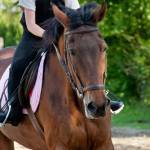Watch Older Horses for Signs of Overheating During Summer Exercise

Older horses usually can’t perform as long or as well as younger horses, especially in the summer when high air temperatures and humidity levels make it difficult to stay comfortable. Researchers at Rutgers University have uncovered factors that limit the ability of senior equines to regulate body temperature in challenging climatic conditions.
Two studies investigated temperature control in older horses. Results showed that senior equines reached a core temperature of 40° C more quickly, had higher heart rates, and produced more sweat than younger horses while exercising in hot, humid conditions. Plasma volume, blood volume, and red cell volumes were lower in older horses compared to young horses. Researchers believed these lower volumes compromised the aged horse’s ability to handle the demands of exercise and also body temperature regulation.
Older horses may not show signs of fatigue and overheating in the early stages, so riders should be careful not to ask for extreme exertion and should be attentive to any indication that the senior equine is beginning to get too hot while exercising. This is especially true for older horses that are ridden only occasionally and are therefore not in fit athletic condition.








